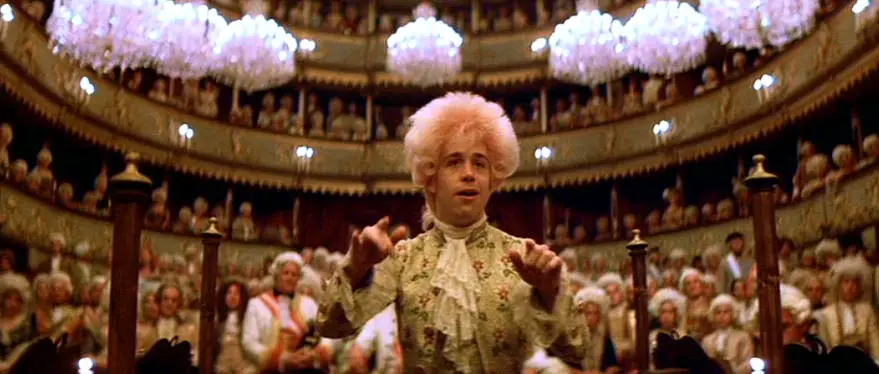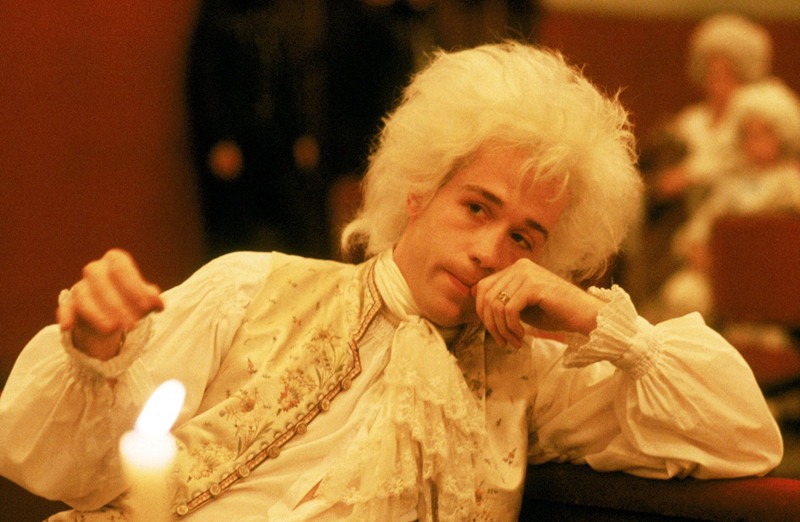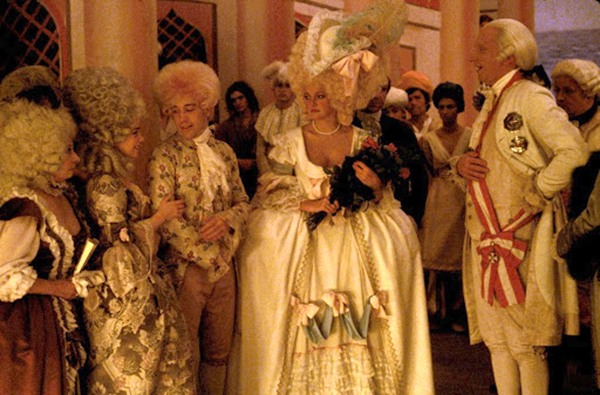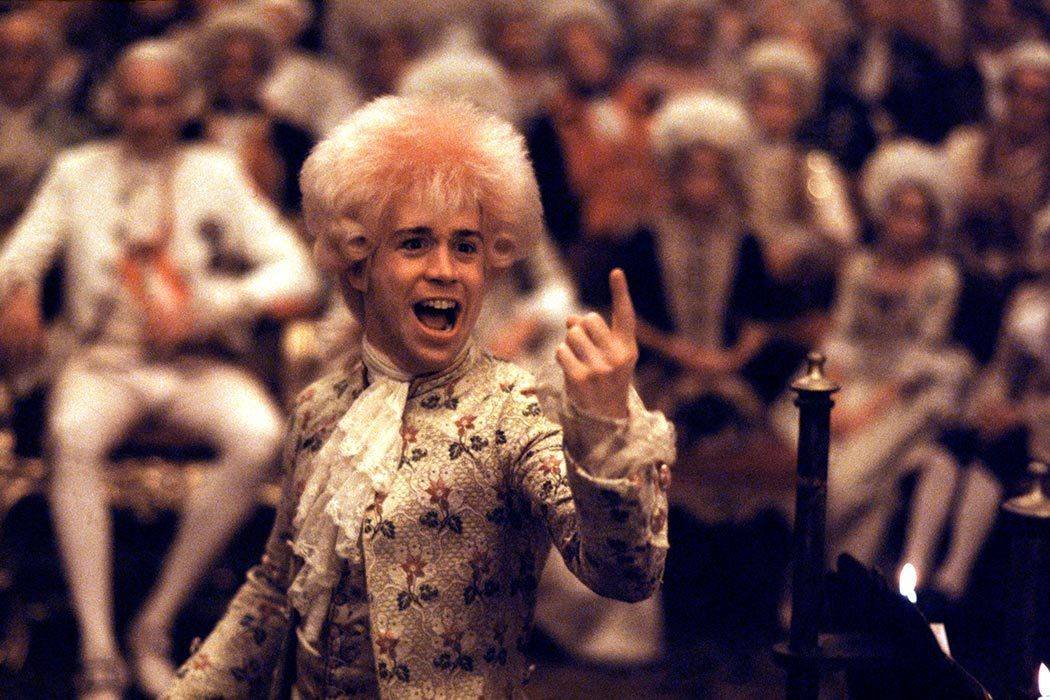Amadeus (1984)

Amadeus (1984) is a period drama film directed by Miloš Forman, with a screenplay by Peter Shaffer, adapted from his own stage play. Set in 18th-century Vienna, the film offers a fictionalized biography of the iconic composer Wolfgang Amadeus Mozart. The story is told from the perspective of Antonio Salieri, a fellow composer who, consumed by jealousy, recounts his complex and often antagonistic relationship with Mozart. With a stellar cast led by Tom Hulce as Mozart and F. Murray Abraham as Salieri, Amadeus blends historical events with dramatic fiction, creating a compelling and tragic narrative about genius, envy, and the human condition.
The film is structured around a retrospective narration by Antonio Salieri (Abraham), who, as an older man, reflects on his life and his obsession with Mozart (Hulce). Salieri, who enjoys a stable and respected career as a composer in Vienna, becomes both fascinated and resentful of Mozart’s unparalleled musical genius. Despite his own devotion to God and music, Salieri feels overshadowed by the irreverent and flamboyant Mozart, who is portrayed as a prodigy with a carefree and often reckless lifestyle. Salieri’s jealousy grows as Mozart’s music is celebrated while his own works are largely ignored. This rivalry leads to Salieri’s psychological and emotional downfall, as he becomes consumed by his obsession with Mozart’s genius and his own sense of inadequacy.
One of the central themes of Amadeus is the exploration of genius and the destructive nature of envy. Salieri’s deep admiration for Mozart’s musical talent is tempered by an intense jealousy, as he perceives Mozart’s brilliance as a gift from God that he himself was denied. This theme is illustrated through Salieri’s internal conflict, as he struggles with the idea that Mozart is a divinely inspired genius, while he himself is a mediocre, yet dutiful, servant of music. Salieri’s envy becomes so overwhelming that he believes he must destroy Mozart in order to reconcile his own feelings of inadequacy. The film poignantly examines how genius can be both a blessing and a curse, and how the pursuit of greatness can lead to self-destruction when tempered by jealousy.
The film is driven by the remarkable performances of its cast, particularly F. Murray Abraham, who portrays the tortured Salieri with depth and nuance. Abraham’s portrayal of Salieri’s descent into madness is both compelling and tragic, capturing the character’s internal turmoil as he grapples with his jealousy and obsession. Tom Hulce’s portrayal of Mozart provides a sharp contrast, presenting the composer as a mischievous and childlike figure, full of exuberance but also deeply flawed. The dynamic between the two characters—the reserved, disciplined Salieri and the impulsive, reckless Mozart—creates a dramatic tension that propels the film. The performances bring the complex psychological landscape of the characters to life, adding layers of emotion and depth to the story.

Amadeus boasts a rich and detailed visual style, with period-accurate costumes and sets that transport viewers to 18th-century Vienna. The cinematography, by Miroslav Ondříček, makes excellent use of light and shadow, emphasizing the contrast between the public grandeur of Mozart’s success and the private darkness of Salieri’s envy. The film’s use of color and composition adds to the dramatic effect, with certain scenes employing striking contrasts between the vibrant, chaotic energy surrounding Mozart and the muted, somber tones reflecting Salieri’s inner turmoil. The elaborate sets, including the opulent court scenes and the more intimate settings of Mozart’s home, also help immerse the audience in the world of 18th-century European aristocracy.

As a film about one of history’s greatest composers, Amadeus is rich with music, incorporating many of Mozart’s most famous compositions. The music serves not only as a backdrop to the drama but also as an integral part of the narrative. Mozart’s compositions—such as his operas, symphonies, and chamber music—are woven into the film to illustrate the genius of the composer and the emotional states of the characters. The soundtrack is used effectively to underscore the tension between Salieri and Mozart, with the music conveying both the beauty of Mozart’s talent and the inner conflict of Salieri. The film’s treatment of music adds depth to the story, making it as much a tribute to Mozart’s genius as it is a reflection on the characters’ emotional landscapes.

In conclusion, Amadeus is a brilliant and unforgettable exploration of genius, jealousy, and the cost of artistic ambition. The film combines exceptional performances, exquisite cinematography, and a powerful soundtrack to create a richly emotional and dramatic portrait of two very different men caught in the complexities of talent and envy. Miloš Forman’s direction, along with Peter Shaffer’s screenplay, brings the historical figures of Mozart and Salieri to life in a way that feels both intimate and grand, creating a compelling narrative that resonates with anyone who has experienced the tension between brilliance and mediocrity. Amadeus stands as a cinematic masterpiece, offering not just a biography of Mozart but a profound meditation on the nature of art, genius, and the human soul.











